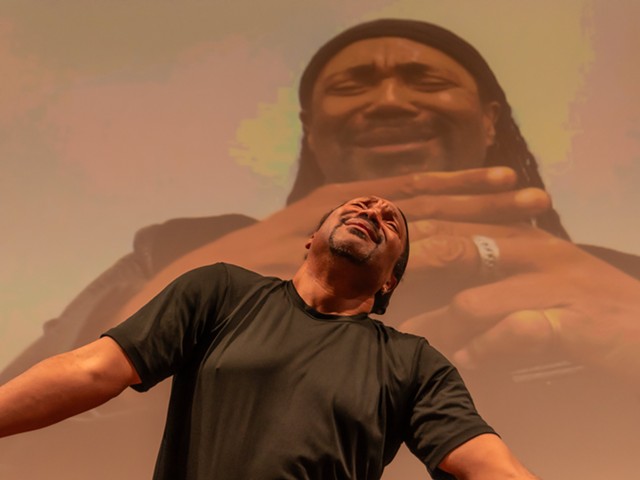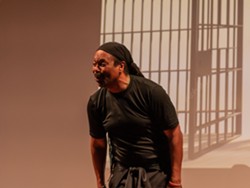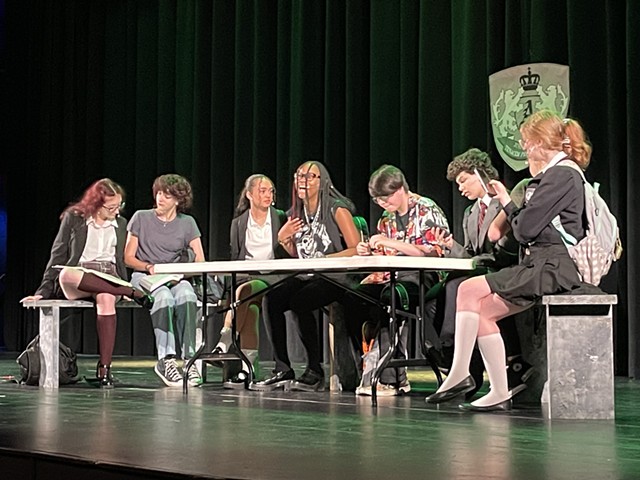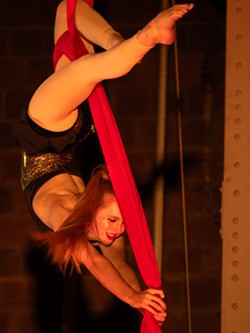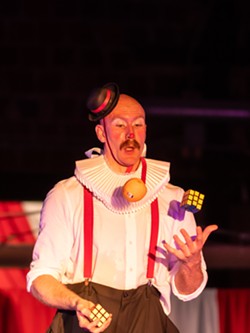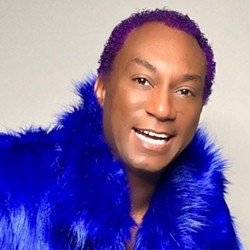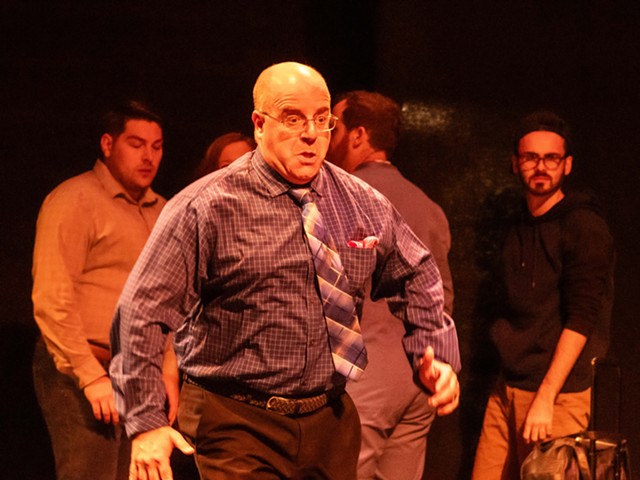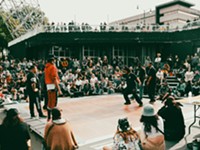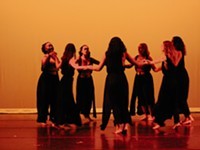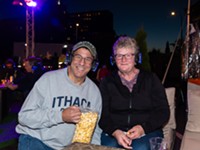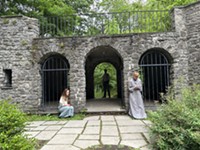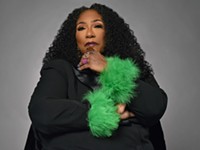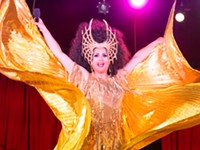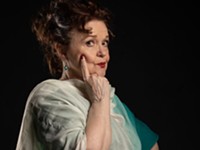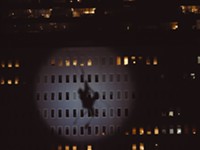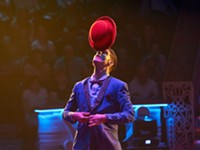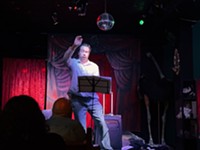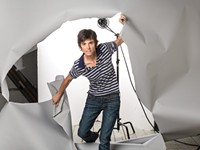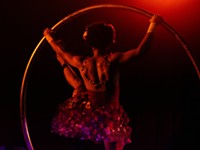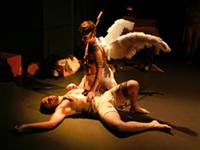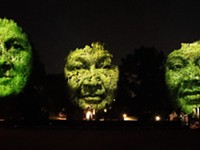[
{
"name": "500x250 Ad",
"insertPoint": "5",
"component": "15667920",
"parentWrapperClass": "",
"requiredCountToDisplay": "1"
}
]
Singing, too, to America
“Black Deaf Male: Who Am I?” | One day only
“Who am I?”
It would seem Fred Michael Beam had answered that question before Sunday's audience at The Little Theatre had even settled into their seats. But over the next hour, much more than 'Black deaf male' would be revealed of Beam, an outreach coordinator for Sunshine 2.0, a theater program at RIT’s National Technical Institute for the Deaf.
Beam has limited vocal skills, so his words were uninterpretable to the audience. He signed his words, his dialogue also spoken by an off-stage voice. Beam acted out some of the scenes, broke into stage-swooping dances, and sometimes appeared as a large video image on the screen behind him. Once the audience was comfortable with how to interface with Beam, a remarkably honest story unfolded.
“Black men, we are everywhere,” he said through his interpreter. “People walking still look at us. If we try to show you who we are, you try to kill us.” “So that’s why we put on our armor. So you don’t bother me.”
The armor: a badass attitude.
What Beam had fallen victim to was a life of reciprocal pain and hate. He struggled with relationships. Social ones. Personal ones. Beam’s boyfriend left him, and he was alone. Yes, we all struggle. But Black and deaf in America is a particular struggle. The point is to triumph.
The audience saw a video of Beam joyously signing to a gospel song. There are advantages to being deaf, he said. As a child, “I couldn’t hear my parents when they were arguing.” When watching television, he couldn’t hear what was being said. But he watched how people moved. He couldn’t hear a Michael Jackson song, but he saw how Jackson danced. When you’re deaf, Beam asked, “What does that mean? I can’t dance?”
Even getting tossed in prison for fighting a cop kinda worked out. “Free food,” Beam said. And deaf people sleep well. Traffic noise, arguments on the street don’t matter. “We don’t give a damn about what’s happening outside.”
Faced with a big line at the airport? Beam confessed to using “the deaf card” to get to the front of the line. Deaf people love to hug, it’s communication. And no one can hear conversation in a crowded dance club anyway.
Beam turned to race, where many fear speaking out loud. He admires the physicality of being Black; white people want to tan their skin. Beam sports a spectacular set of tightly braided dreads; Black people getting their hair done “is a Black event.” He points to a photo on the screen of well-rounded lips on Black models. White churches are polite, Beam said, Black churches are a concert. And that style of movement, which he prescribes as Black in nature: “Let your bottom half flow.”
Yet, the point seemed to be — what do these differences really mean? We all face lines at the airport. We all hug. Beam quoted from the Langston Hughes poem, “I, Too.” The one, written from a Black perspective, that opens with the line, “I, too, sing America.” — JEFF SPEVAK
High school musical
“Ranked” | Sept. 23 | $12 | All ages
The tagline, “Pain is temporary, grades last forever,” sets the stage for a musical that explores a not-too-unrealistic dystopian world in which everything depends on academic success, and high schoolers are put through the ringer trying to stay “above average” at all costs.
Between the teens’ obsession with the ranking system — delivered via mobile app and in an in-school live broadcasts of leaderboard updates — and the vicious cliques that divide the kids, it felt like a cross between “Black Mirror” and “Mean Girls.”
The two-hour production, written by David Taylor Gomes and Kyle Holmes, has a cast of more than two dozen students enrolled in the Musical Theatre Education program that operates from the old Penny Arcade spot on Lake Ave. They sing and lament their way through the drama, eliciting knowing laughs from the adults in the audience. There’s a neat audience participation aspect where you can sign up to receive text updates so you’re getting the updated ranks as the teens are, and can feel a shred of their stress.
The story is told entirely from the teens’ perspective, with parents’ and teachers’ voices only coming in secondhand through the kids’ discussions about their pressure on the kids. It mostly centers on Lily (Kylie DeFranco), who is at-risk of falling below average, and John (Vinny Bruni), who along with his sister fell below average when tragedy struck their family. Together, with their siblings and peers, they navigate self-esteem, shifting values, and what happens when the system stops working.
There’s a strong message in the show that the whole lives of the kids need to be taken into consideration and that there’s worth outside of this one measure of success, and it’s one that parents, teachers, and schools should always take into account. —REBECCA RAFFERTY
Wonder and awe
“Circus of Play” | Sept. 18, 21-23 | $18 | All ages
Not all circus performances come with a storyline or theme — the impressive feats are thrilling enough — but when they do, it provides an additional anchor for the imagination. “Circus of Play,” presented by ROC City Circus at its home base on University Ave., takes its inspiration from child-like wonder, and is set in the Museum of Play.
The creative team built a great show that imagines the circus through the perspective of a child who sees a toy display and imagines a classic circus coming to life, in which the colors and lights are just a little brighter and the daring acts seem even more incredible.
Featuring dozens of performers of all ages, there were multiple focused aerial arts acts with plenty of silliness injected throughout, and at some points there were multiple things happening at once — folks flew on the trapeze while a man balanced on a gigantic ball, other performers climbed silks or spun in suspended rings, all while clowns did their clowning.
This wonderful show was sold out for its first performance, and the packed house made it a bit difficult to see some of the acts taking place on the floor — with rows of seating on three sides of the performance area and no elevation, it’s easy to find the view blocked by a taller person in front of you.
Luckily, so much of the show takes place in the air. If you go, get there early (and if you’re tall, sit in the back)! —REBECCA RAFFERTY
The sole, and soul, of creativity
“Thomas Warfield – The Way of Poetry: The Lyrical, Narrative, Spoken Word” | One day only
Thomas Warfield, a senior lecturer at the Rochester Institute of Technology’s National Technical Institute for the Deaf, has lived his 60 years as many of us wish we could. Even as an underage teenager, he could hit the dance floor at the notorious New York City disco, Studio 54, because “I always wore such outrageous stuff,” he said. “They always wanted me to come in.”
So, the stage at The Little Theatre Sunday morning was easy pickings. Always a walking fashion statement, Warfield wore what looked like a lab coat covered in artsy graffiti. And we got our money’s worth out of him on this day. First, the 11 a.m. show at The Little. Then, reprising his role at 7 p.m. as the title character in Geva Theater Center’s The Wizard of Oz. Warfield as the Wizard is typecasting, of course. Because even on his own, Warfield is a bit of a magical character in this town.
Fashion icon, dancer, singer, world traveler, collector of celebrity encounters. Poet? He writes a Christmas poem every year, and includes it in the cards he sends.
“It’s time to do a book of poetry,” he announced, waving a sheaf of paper at The Little audience, as he confessed: “This is how far I got.”
Warfield has an excuse for not yet getting those words into print. He’s a busy man. His Fringe show, the punctuation-heavy “Thomas Warfield – The Way of Poetry: The Lyrical, Narrative, Spoken Word,” was equal parts readings of his own poetry and loquacious explanations of what was behind the creation of the poems. The English language – he also sort of speaks French – was built for Warfield.
Accompanied on double bass by Wynter McCrae, an Eastman School of Music student from Columbia, S.C., Warfield read his poems as a chronological travelogue of his life, reaching back to when he first began writing them, at about age 17 or 18. “These Shoes,” is from 1981, his high-school love story. “My shoes and I became sensuous,” he read, yet the inevitable fate awaited: “Its holes too big, my tears were many.”
Life rears its threadbare sole, and soul. The initial reaction to Warfield’s words is sadness, a resignation to loss. Falling in and out of love.
But this is not tragedy. Leaving something behind can also be moving forward.
“I always fell in love, and then it kind of went on its way,” Warfield said. “And I was still there.” That was the lead-in to his poem, “Let Me Love You in Silence," which he read first in the original French, before translating it into English.
Warfield shared how, as a 21-year-old gay man, he took his mother to see Barbra Streisand in "Yentl," then sat through the film two more times that night, and 13 times that week (by the way, he also owns a DVD copy). Warfield gives freely of his emotions. In his poem, “We Dance,” he read of “emotionless movement betraying what is to be imagined.”
His poem “The River,” came out of “a time of deep longing for a boyfriend,” using a river as a metaphor for moving on. It’s a universal image, Bruce Springsteen did the same with a song of the same name.
And loss may not necessarily be sadness, as Warfield suggests in his poem, “Change Extends Me.” It is “the dreamers’ thoughts expressed.”
That image can take on larger meaning. Warfield recalled a lunch meeting he had with legendary conductor Leonard Bernstein. "The artist is the one who has the vision, and moves society forward,” Bernstein said.
Moving forward, Warfield created an organization for world peace, DanceArt, which evolved into PeaceArt. And spiraled off into “AstroDance,” a fusion of dance and astrophysics, a collision with Einstein’s theories of gravitational waves (And no longer a theory, but proven science, Warfield points out; Carl Sagan gave him a book on such astronomical musings).
Among the aims of these organizational journeys was working with Romanian orphans who have HIV. There are larger causes than ourselves, Warfield suggests, reciting a poem called “Of Me Myself,” a Whitman-like proclamation with the line “I am the eternal, it’s life that is not.”
When Daniel Prude was killed during a mental health crisis in the midst of protests in Rochester’s streets in 2020, Warfield was among the protesters, accusing the police of murder. Serious talk. Yet when Warfield asked his audience on Sunday to shout out words and lines to use in the creation of a poem, right there on The Little stage, he got “jubilant.” And “sunflowers.” And “community.” And “warm breeze.” Upbeat imagery.
So perhaps sadness and cynicism is not all we have to offer. Our opportunities are brief — the idea behind Warfield’s poem, “Before the Petals Close.” And before closing with the song that often concludes Warfield’s talks and performances, “Somewhere Over the Rainbow,” from The Wizard of Oz, he found upbeat words as well:
“I am so grateful for your creativity.” —JEFF SPEVAK
At least I didn’t fake it
“That’s What She Said: Broadway Diva Power Ballads” | Two nights only
Nick Rogers does things his own way. During Sunday's show at School of the Arts, his Broadway cabaret outfit was a deep blue suit with flowers, the shirt buttons popped open to reveal a hint of intricately patterned chest tattoo.
“That’s What She Said” was a solo evening of contemporary Broadway (more Menzel than Merman) with a set list that would make Rachel Berry jealous.
A Rochester native, Rogers moved to a Mexican beach town last year to pursue a career in performance. He tried to spin this into a “dreams do come true” through line for the night with a series of vague platitudes: follow your dreams. Sometimes things don’t work out. Cherish what’s important.
The real reason he chose each song was simple: they’re bangers. He said he’d listen to his favorite divas sing these incredible ballads and think, “Bitch, that’s not fair.” (How hard it must be for men!)
Rogers has a lovely, rich baritenor voice. Can he act? Sort of. The contrast between the power of his belt and the sheer averageness of his acting was distracting. He did himself no favors by performing to a pre-recorded karaoke track, which constrained his timing and limited his expression. A few words got swallowed in keeping with the tempo. He missed a cue; songs ended abruptly. The keys of the beautiful grand piano behind him were never touched.
The audience didn’t care. The small but supportive crowd consisted of Broadway fans who gasped in recognition at opening chords to songs like “Defying Gravity,” “You’ll Never Walk Alone,” and “I Dreamed a Dream.”
When Rogers apologized for a mic malfunction, an audience member called out “You killed it anyway!” Nobody was here to rain on his parade. —KATHERINE VARGA
Words are overrated
“Emotional Baggage” | Two nights only
Have you ever seen travelers waiting at a train station but didn’t say a word to them because they’re complete strangers? Have you ever wondered what they carry?
On Sunday night at School of the Arts, Last Fool Productions presented “Emotional Baggage,” a 20-minute play without words written by Lindsay Price. Deftly directed by Mandi Lynn Griffith and Jason Rugg, this piece felt like a silent film made theatrical. Realistic slice-of-life interactions mixed with representations of the characters’ inner emotions as expressed through dance, all set to subdued jazz played by a keyboard, violin, and bass. Train whistle toots from a trumpet began and ended the scenes.
One janitor and eight travelers. A woman rips pages out of a magazine, much to the janitor’s chagrin. The diva imagines dancing in the spotlight. The guy rolls on a box, which happens to contain an older woman (his mother?). The businessman with the briefcase keeps checking the pulse on his neck.
The indifference of these strangers gets interrupted by the arrival of a manic pixie dream girl-esque figure donning a red skirt and “Love” t-shirt with a black ukulele case on her back. She waves at everyone, eager for connection. The others regard her and her case suspiciously. She sets aside the magazine with the ripped out pages and gives the woman a compact mirror. She gets the guy with the box to mess up his hair. She mostly ignores the guy who furiously eats a bag of chips. Eventually, the train comes. Some travelers leave, some stay.
“Don’t ask me what it was about,” said an audience member after curtain call.
He didn’t sound upset. —KATHERINE VARGA
“Black Deaf Male: Who Am I?” | One day only
“Who am I?”
It would seem Fred Michael Beam had answered that question before Sunday's audience at The Little Theatre had even settled into their seats. But over the next hour, much more than 'Black deaf male' would be revealed of Beam, an outreach coordinator for Sunshine 2.0, a theater program at RIT’s National Technical Institute for the Deaf.
Beam has limited vocal skills, so his words were uninterpretable to the audience. He signed his words, his dialogue also spoken by an off-stage voice. Beam acted out some of the scenes, broke into stage-swooping dances, and sometimes appeared as a large video image on the screen behind him. Once the audience was comfortable with how to interface with Beam, a remarkably honest story unfolded.
“Black men, we are everywhere,” he said through his interpreter. “People walking still look at us. If we try to show you who we are, you try to kill us.” “So that’s why we put on our armor. So you don’t bother me.”
The armor: a badass attitude.
What Beam had fallen victim to was a life of reciprocal pain and hate. He struggled with relationships. Social ones. Personal ones. Beam’s boyfriend left him, and he was alone. Yes, we all struggle. But Black and deaf in America is a particular struggle. The point is to triumph.
The audience saw a video of Beam joyously signing to a gospel song. There are advantages to being deaf, he said. As a child, “I couldn’t hear my parents when they were arguing.” When watching television, he couldn’t hear what was being said. But he watched how people moved. He couldn’t hear a Michael Jackson song, but he saw how Jackson danced. When you’re deaf, Beam asked, “What does that mean? I can’t dance?”
Even getting tossed in prison for fighting a cop kinda worked out. “Free food,” Beam said. And deaf people sleep well. Traffic noise, arguments on the street don’t matter. “We don’t give a damn about what’s happening outside.”
Faced with a big line at the airport? Beam confessed to using “the deaf card” to get to the front of the line. Deaf people love to hug, it’s communication. And no one can hear conversation in a crowded dance club anyway.
Beam turned to race, where many fear speaking out loud. He admires the physicality of being Black; white people want to tan their skin. Beam sports a spectacular set of tightly braided dreads; Black people getting their hair done “is a Black event.” He points to a photo on the screen of well-rounded lips on Black models. White churches are polite, Beam said, Black churches are a concert. And that style of movement, which he prescribes as Black in nature: “Let your bottom half flow.”
Yet, the point seemed to be — what do these differences really mean? We all face lines at the airport. We all hug. Beam quoted from the Langston Hughes poem, “I, Too.” The one, written from a Black perspective, that opens with the line, “I, too, sing America.” — JEFF SPEVAK
High school musical
“Ranked” | Sept. 23 | $12 | All ages
The tagline, “Pain is temporary, grades last forever,” sets the stage for a musical that explores a not-too-unrealistic dystopian world in which everything depends on academic success, and high schoolers are put through the ringer trying to stay “above average” at all costs.
Between the teens’ obsession with the ranking system — delivered via mobile app and in an in-school live broadcasts of leaderboard updates — and the vicious cliques that divide the kids, it felt like a cross between “Black Mirror” and “Mean Girls.”
The two-hour production, written by David Taylor Gomes and Kyle Holmes, has a cast of more than two dozen students enrolled in the Musical Theatre Education program that operates from the old Penny Arcade spot on Lake Ave. They sing and lament their way through the drama, eliciting knowing laughs from the adults in the audience. There’s a neat audience participation aspect where you can sign up to receive text updates so you’re getting the updated ranks as the teens are, and can feel a shred of their stress.
The story is told entirely from the teens’ perspective, with parents’ and teachers’ voices only coming in secondhand through the kids’ discussions about their pressure on the kids. It mostly centers on Lily (Kylie DeFranco), who is at-risk of falling below average, and John (Vinny Bruni), who along with his sister fell below average when tragedy struck their family. Together, with their siblings and peers, they navigate self-esteem, shifting values, and what happens when the system stops working.
There’s a strong message in the show that the whole lives of the kids need to be taken into consideration and that there’s worth outside of this one measure of success, and it’s one that parents, teachers, and schools should always take into account. —REBECCA RAFFERTY
Wonder and awe
“Circus of Play” | Sept. 18, 21-23 | $18 | All ages
Not all circus performances come with a storyline or theme — the impressive feats are thrilling enough — but when they do, it provides an additional anchor for the imagination. “Circus of Play,” presented by ROC City Circus at its home base on University Ave., takes its inspiration from child-like wonder, and is set in the Museum of Play.
The creative team built a great show that imagines the circus through the perspective of a child who sees a toy display and imagines a classic circus coming to life, in which the colors and lights are just a little brighter and the daring acts seem even more incredible.
Featuring dozens of performers of all ages, there were multiple focused aerial arts acts with plenty of silliness injected throughout, and at some points there were multiple things happening at once — folks flew on the trapeze while a man balanced on a gigantic ball, other performers climbed silks or spun in suspended rings, all while clowns did their clowning.
This wonderful show was sold out for its first performance, and the packed house made it a bit difficult to see some of the acts taking place on the floor — with rows of seating on three sides of the performance area and no elevation, it’s easy to find the view blocked by a taller person in front of you.
Luckily, so much of the show takes place in the air. If you go, get there early (and if you’re tall, sit in the back)! —REBECCA RAFFERTY
The sole, and soul, of creativity
“Thomas Warfield – The Way of Poetry: The Lyrical, Narrative, Spoken Word” | One day only
Thomas Warfield, a senior lecturer at the Rochester Institute of Technology’s National Technical Institute for the Deaf, has lived his 60 years as many of us wish we could. Even as an underage teenager, he could hit the dance floor at the notorious New York City disco, Studio 54, because “I always wore such outrageous stuff,” he said. “They always wanted me to come in.”
So, the stage at The Little Theatre Sunday morning was easy pickings. Always a walking fashion statement, Warfield wore what looked like a lab coat covered in artsy graffiti. And we got our money’s worth out of him on this day. First, the 11 a.m. show at The Little. Then, reprising his role at 7 p.m. as the title character in Geva Theater Center’s The Wizard of Oz. Warfield as the Wizard is typecasting, of course. Because even on his own, Warfield is a bit of a magical character in this town.
Fashion icon, dancer, singer, world traveler, collector of celebrity encounters. Poet? He writes a Christmas poem every year, and includes it in the cards he sends.
“It’s time to do a book of poetry,” he announced, waving a sheaf of paper at The Little audience, as he confessed: “This is how far I got.”
Warfield has an excuse for not yet getting those words into print. He’s a busy man. His Fringe show, the punctuation-heavy “Thomas Warfield – The Way of Poetry: The Lyrical, Narrative, Spoken Word,” was equal parts readings of his own poetry and loquacious explanations of what was behind the creation of the poems. The English language – he also sort of speaks French – was built for Warfield.
Accompanied on double bass by Wynter McCrae, an Eastman School of Music student from Columbia, S.C., Warfield read his poems as a chronological travelogue of his life, reaching back to when he first began writing them, at about age 17 or 18. “These Shoes,” is from 1981, his high-school love story. “My shoes and I became sensuous,” he read, yet the inevitable fate awaited: “Its holes too big, my tears were many.”
Life rears its threadbare sole, and soul. The initial reaction to Warfield’s words is sadness, a resignation to loss. Falling in and out of love.
But this is not tragedy. Leaving something behind can also be moving forward.
“I always fell in love, and then it kind of went on its way,” Warfield said. “And I was still there.” That was the lead-in to his poem, “Let Me Love You in Silence," which he read first in the original French, before translating it into English.
Warfield shared how, as a 21-year-old gay man, he took his mother to see Barbra Streisand in "Yentl," then sat through the film two more times that night, and 13 times that week (by the way, he also owns a DVD copy). Warfield gives freely of his emotions. In his poem, “We Dance,” he read of “emotionless movement betraying what is to be imagined.”
His poem “The River,” came out of “a time of deep longing for a boyfriend,” using a river as a metaphor for moving on. It’s a universal image, Bruce Springsteen did the same with a song of the same name.
And loss may not necessarily be sadness, as Warfield suggests in his poem, “Change Extends Me.” It is “the dreamers’ thoughts expressed.”
That image can take on larger meaning. Warfield recalled a lunch meeting he had with legendary conductor Leonard Bernstein. "The artist is the one who has the vision, and moves society forward,” Bernstein said.
Moving forward, Warfield created an organization for world peace, DanceArt, which evolved into PeaceArt. And spiraled off into “AstroDance,” a fusion of dance and astrophysics, a collision with Einstein’s theories of gravitational waves (And no longer a theory, but proven science, Warfield points out; Carl Sagan gave him a book on such astronomical musings).
Among the aims of these organizational journeys was working with Romanian orphans who have HIV. There are larger causes than ourselves, Warfield suggests, reciting a poem called “Of Me Myself,” a Whitman-like proclamation with the line “I am the eternal, it’s life that is not.”
When Daniel Prude was killed during a mental health crisis in the midst of protests in Rochester’s streets in 2020, Warfield was among the protesters, accusing the police of murder. Serious talk. Yet when Warfield asked his audience on Sunday to shout out words and lines to use in the creation of a poem, right there on The Little stage, he got “jubilant.” And “sunflowers.” And “community.” And “warm breeze.” Upbeat imagery.
So perhaps sadness and cynicism is not all we have to offer. Our opportunities are brief — the idea behind Warfield’s poem, “Before the Petals Close.” And before closing with the song that often concludes Warfield’s talks and performances, “Somewhere Over the Rainbow,” from The Wizard of Oz, he found upbeat words as well:
“I am so grateful for your creativity.” —JEFF SPEVAK
At least I didn’t fake it
“That’s What She Said: Broadway Diva Power Ballads” | Two nights only
Nick Rogers does things his own way. During Sunday's show at School of the Arts, his Broadway cabaret outfit was a deep blue suit with flowers, the shirt buttons popped open to reveal a hint of intricately patterned chest tattoo.
“That’s What She Said” was a solo evening of contemporary Broadway (more Menzel than Merman) with a set list that would make Rachel Berry jealous.
A Rochester native, Rogers moved to a Mexican beach town last year to pursue a career in performance. He tried to spin this into a “dreams do come true” through line for the night with a series of vague platitudes: follow your dreams. Sometimes things don’t work out. Cherish what’s important.
The real reason he chose each song was simple: they’re bangers. He said he’d listen to his favorite divas sing these incredible ballads and think, “Bitch, that’s not fair.” (How hard it must be for men!)
Rogers has a lovely, rich baritenor voice. Can he act? Sort of. The contrast between the power of his belt and the sheer averageness of his acting was distracting. He did himself no favors by performing to a pre-recorded karaoke track, which constrained his timing and limited his expression. A few words got swallowed in keeping with the tempo. He missed a cue; songs ended abruptly. The keys of the beautiful grand piano behind him were never touched.
The audience didn’t care. The small but supportive crowd consisted of Broadway fans who gasped in recognition at opening chords to songs like “Defying Gravity,” “You’ll Never Walk Alone,” and “I Dreamed a Dream.”
When Rogers apologized for a mic malfunction, an audience member called out “You killed it anyway!” Nobody was here to rain on his parade. —KATHERINE VARGA
Words are overrated
“Emotional Baggage” | Two nights only
Have you ever seen travelers waiting at a train station but didn’t say a word to them because they’re complete strangers? Have you ever wondered what they carry?
On Sunday night at School of the Arts, Last Fool Productions presented “Emotional Baggage,” a 20-minute play without words written by Lindsay Price. Deftly directed by Mandi Lynn Griffith and Jason Rugg, this piece felt like a silent film made theatrical. Realistic slice-of-life interactions mixed with representations of the characters’ inner emotions as expressed through dance, all set to subdued jazz played by a keyboard, violin, and bass. Train whistle toots from a trumpet began and ended the scenes.
One janitor and eight travelers. A woman rips pages out of a magazine, much to the janitor’s chagrin. The diva imagines dancing in the spotlight. The guy rolls on a box, which happens to contain an older woman (his mother?). The businessman with the briefcase keeps checking the pulse on his neck.
The indifference of these strangers gets interrupted by the arrival of a manic pixie dream girl-esque figure donning a red skirt and “Love” t-shirt with a black ukulele case on her back. She waves at everyone, eager for connection. The others regard her and her case suspiciously. She sets aside the magazine with the ripped out pages and gives the woman a compact mirror. She gets the guy with the box to mess up his hair. She mostly ignores the guy who furiously eats a bag of chips. Eventually, the train comes. Some travelers leave, some stay.
“Don’t ask me what it was about,” said an audience member after curtain call.
He didn’t sound upset. —KATHERINE VARGA
In This Guide...
Latest in Rochester Fringe Festival
More by CITY STAFF
-

Meet CITY's new arts writer: Patrick Hosken
Apr 1, 2024 -

Constant cravings
Mar 8, 2024 -
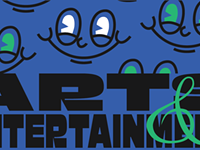
Best Of Rochester: Arts & Entertainment
Jan 10, 2024 - More »
